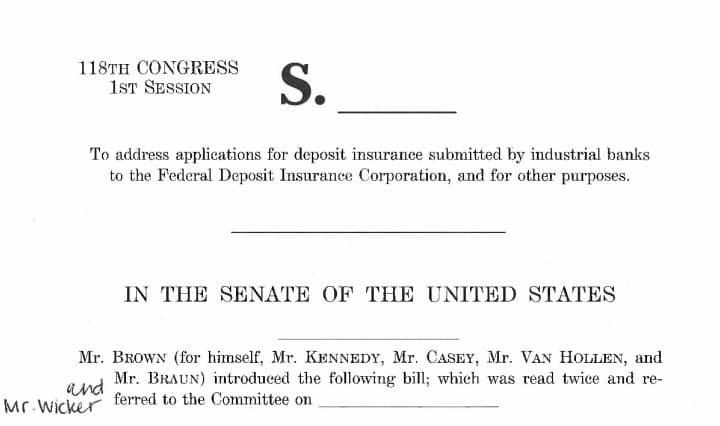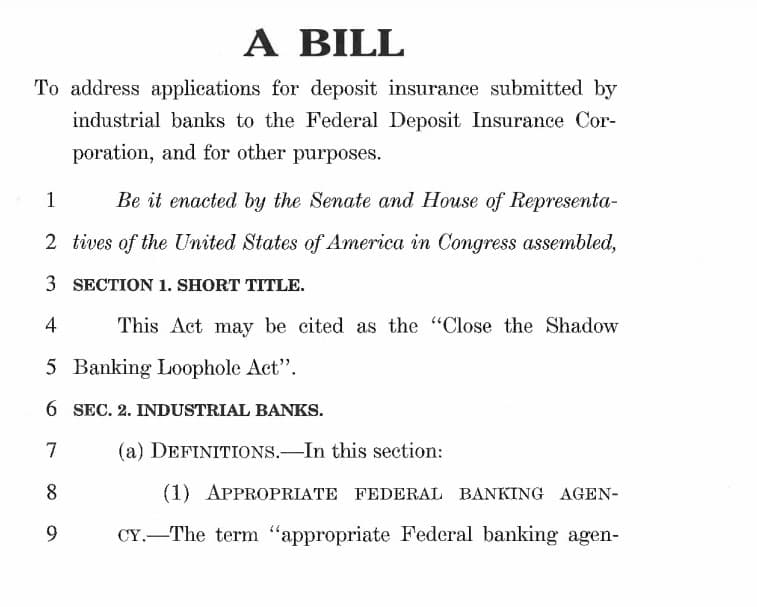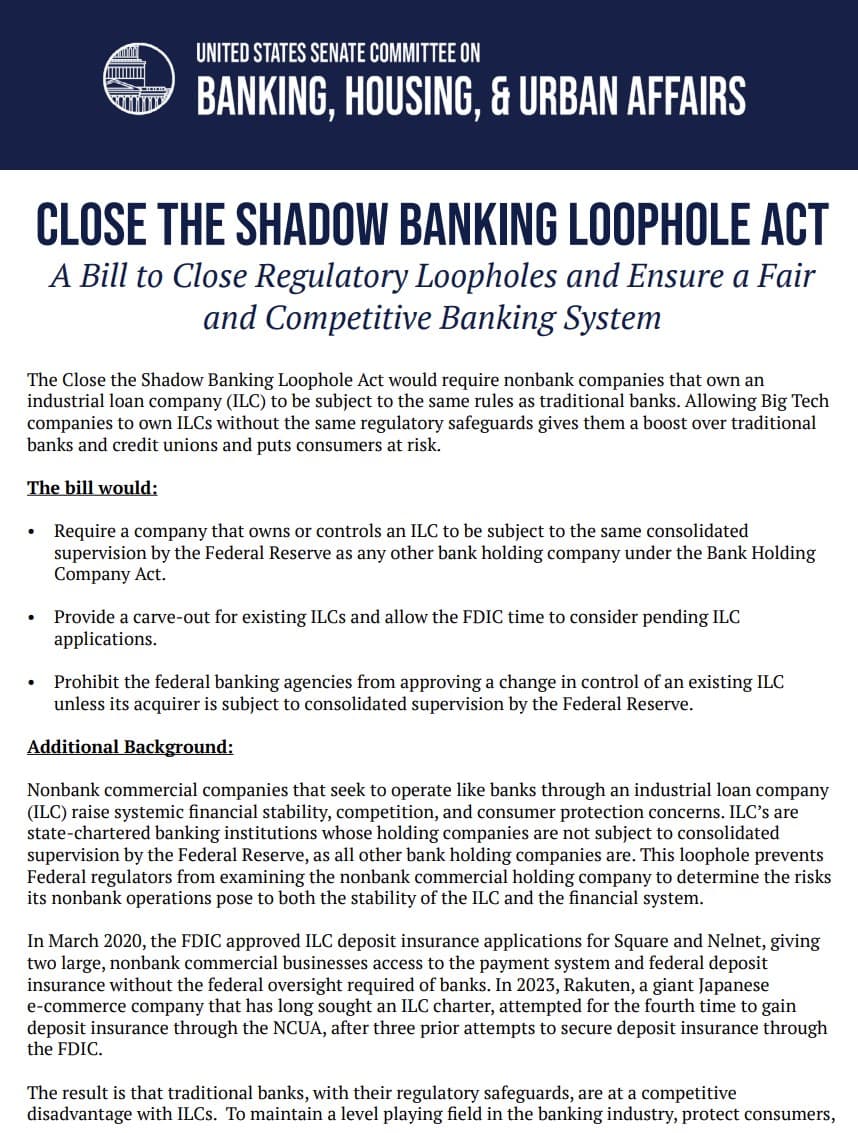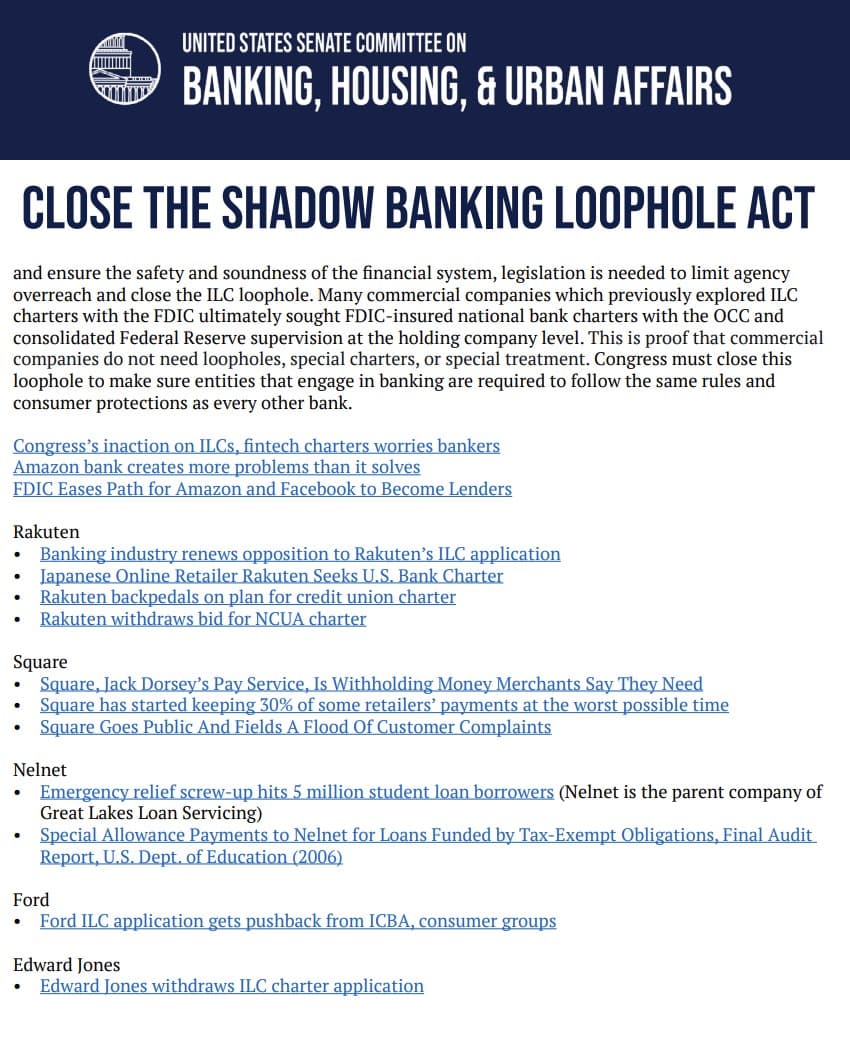Senators reintroduce the Close the Shadow Banking Loophole Act, which would require nonbank companies that own an industrial loan company (ILC) to be subject to the same rules as traditional banks and close regulatory loopholes.


Fact Sheet:


Press Release:
Today, U.S. Senator Sherrod Brown (D-OH), Chairman of the Senate Committee on Banking, Housing, and Urban Affairs, along with Senators John Kennedy (R-LA), Bob Casey (D-PA), Chris Van Hollen (D-MD), Mike Braun (R-IN), and Roger Wicker (R-MS) reintroduced the Close the Shadow Banking Loophole Act, legislation to require companies that own an industrial loan company (ILC) to be subject to the same rules and consumer protections as traditional banks.
“Letting Big Tech and commercial companies operate banks without proper oversight will only open doors for predatory lending, invasions of consumer privacy, and broader financial instability,” said Brown. “To protect consumers’ pocketbooks and ensure a strong banking system for Main Street, we need to ensure all banking institutions play by the same rules.”
“American consumers deserve confidence that our financial system is stable and accountable to protect consumers. Allowing companies to run their own big full-service banks without effective oversight puts individual Americans and the U.S. financial system at risk. I’m working to close the shadow banking loopholes that have left consumers vulnerable,” said Kennedy.
“When commercial entities act like banks but aren’t held to the same standards as banks, it puts consumers at risk. Closing the shadow banking loophole will ensure these companies play by the same rules – and uphold the same consumer safeguards – in order to protect Americans’ economic security and ensure a fairer, safer financial system,” said Van Hollen.
ILCs are state-chartered banking institutions whose holding companies are not subject to consolidated supervision by the Federal Reserve, as all other bank holding companies are, due to a loophole in the Bank Holding Company Act. The result is that ILCs owned by tech companies like Square have a leg-up on traditional banks with regulatory safeguards.
The Close the Shadow Banking Loophole Act would close this loophole. The bill requires companies that acquire an ILC to be subject to the same supervision by the Federal Reserve as any other bank holding company under the Bank Holding Company Act. It would also provide a carve-out for existing ILCs.
“The long-standing policy prohibiting affiliations or combinations between banks and non-financial commercial firms has served our nation well. This legislation would ensure no violations of the U.S. policy of maintaining the separation of banking and commerce can occur. Such a violation would jeopardize the impartial allocation of credit, creating conflicts of interest, a dangerous concentration of commercial and economic power, and unwisely extends the federal safety net to commercial interests,” said Michael Adelman, President and CEO of the Ohio Bankers League.
“We commend Chairman Brown and Senator Kennedy’s bipartisan effort to close the loophole allowing Industrial Loan Companies to evade oversight. This bill advances the basic principle that all financial entities with similar products ought to be regulated and supervised similarly,” said Mitria Spotser, vice president and director of federal policy at the Center for Responsible Lending. “The Close the Shadow Banking Loophole Act would help stop ILCs from evading accountability and, in the process, exposing consumers, taxpayers and the market to increased risk.”
“ICBA and the nation’s community banks thank Chairman Brown and Sen. Kennedy for introducing bipartisan legislation to permanently close the industrial loan company loophole,” ICBA President and CEO Rebeca Romero Rainey said. “The ILC loophole allows large commercial and technology firms to own full-service banks while skirting regulatory oversight—threatening the financial system, endangering consumers, and creating an uneven regulatory landscape. The Close the Shadow Banking Loophole Act will ensure any company that wishes to own a full-service bank is subject to the same restrictions and supervision that apply to any other bank holding company.”
“History has shown us the consequences of allowing companies to operate like banks without the necessary safeguards," said Renita Marcellin, Legislative and Advocacy Director at Americans for Financial Reform. "ILCs are a part of that history, as seen during the 2008 financial crisis. AFR applauds this meaningful step to close this loophole that allows tech conglomerates and other commercial companies to skirt our banking laws."
“BPI supports Chairman Brown and Senator Kennedy’s bipartisan efforts to close the ILC loophole and guarantee equal treatment for entities providing indistinguishable banking products and services under the law. Any entity seeking the benefits of bank ownership must be held to the same rules that apply to banks to prevent unacceptable risks to consumers, taxpayers and the existing financial framework,” said Greg Baer, President and CEO of the Bank Policy Institute.
The legislation has been endorsed by Americans for Financial Reform, Ohio Credit Union League, Bank Policy Institute, Center for Responsible Lending, Independent Community Bankers of America, National Community Reinvestment Coalition, PNC Financial Services Group, Ohio Bankers League, Credit Union National Association, National Association of Federally-Insured Credit Unions, and Art Wilmarth, Professor Emeritus of Law at George Washington University.
Brown has long fought to protect consumers from risks in the financial sector. Brown first introduced legislation to close the ILC loophole in 2007.

TLDRS:
- U.S. Senator Sherrod Brown (D-OH), Chairman of the Senate Committee on Banking, Housing, and Urban Affairs, along with Senators John Kennedy (R-LA), Bob Casey (D-PA), Chris Van Hollen (D-MD), Mike Braun (R-IN), and Roger Wicker (R-MS) reintroduced the Close the Shadow Banking Loophole Act, legislation to require companies that own an industrial loan company (ILC) to be subject to the same rules and consumer protections as traditional banks.
- Brown has long fought to protect consumers from risks in the financial sector. Brown first introduced legislation to close the ILC loophole in 2007.
- The "Close the Shadow Banking Loophole Act" aims to ensure that nonbank companies owning an industrial loan company (ILC) are subject to the same regulations as traditional banks.
- The bill requires companies owning or controlling an ILC to undergo consolidated supervision by the Federal Reserve, similar to other bank holding companies under the Bank Holding Company Act.
- It includes a provision for existing ILCs, allowing time for the FDIC to review pending ILC applications and prohibits approval of changes in control of existing ILCs unless the acquirer is also under Federal Reserve supervision.
- The act addresses concerns about systemic financial stability, competition, and consumer protection posed by nonbank commercial companies operating as banks through ILCs, which are currently exempt from Federal Reserve consolidated supervision.
- The legislation seeks to level the playing field in the banking industry, ensuring that entities engaging in banking activities adhere to the same rules and consumer protections as traditional banks.
- The move towards FDIC-insured national bank charters by commercial companies previously exploring ILCs with the FDIC indicates that these entities can operate effectively without special charters or treatment, highlighting the necessity of closing the ILC loophole.



